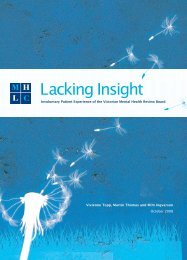Reducing Ethnic Profiling in the European Union - Open Society ...
Reducing Ethnic Profiling in the European Union - Open Society ...
Reducing Ethnic Profiling in the European Union - Open Society ...
- No tags were found...
You also want an ePaper? Increase the reach of your titles
YUMPU automatically turns print PDFs into web optimized ePapers that Google loves.
esponses, and <strong>in</strong> some cases, broad questions address<strong>in</strong>g trust and confidence <strong>in</strong> public<strong>in</strong>stitutions <strong>in</strong>clud<strong>in</strong>g law enforcement agencies. In 2011 and 2012, <strong>the</strong> “Eurojustissurvey” was conducted <strong>in</strong> 26 countries across <strong>the</strong> EU and <strong>in</strong>cluded questions on trustand legitimacy of law enforcement and <strong>the</strong> courts.Surveys can also <strong>in</strong>clude questions designed to capture <strong>in</strong>dividuals’ experienceswith law enforcement such as when <strong>the</strong> person last had contact with law enforcement;whe<strong>the</strong>r that contact was <strong>in</strong>itiated by <strong>the</strong> civilian or <strong>the</strong> officer; what <strong>the</strong> outcome was;<strong>the</strong> conduct of <strong>the</strong> encounter; and <strong>the</strong> persons’ satisfaction with <strong>the</strong> encounter. 170The London Metropolitan Police Service (MPS) undertakes a number of publicop<strong>in</strong>ion surveys to assess public concerns about crime and satisfaction with policeaction. The largest survey is <strong>the</strong> MPS Public Attitudes Survey (PAS), which collectsdata annually from around 20,000 <strong>in</strong>dividuals us<strong>in</strong>g face-to-face <strong>in</strong>terviews with a representativesample of Londoners. This survey has <strong>in</strong>cluded a booster sample of 1,000men aged 18–30 from m<strong>in</strong>ority ethnic backgrounds, ask<strong>in</strong>g questions focused on issuesaround stops and searches, procedural justice, and police legitimacy.In 2010, <strong>the</strong> EU Fundamental Rights Agency released <strong>the</strong> results of a survey onm<strong>in</strong>orities’ experiences of polic<strong>in</strong>g <strong>in</strong> <strong>the</strong> <strong>European</strong> <strong>Union</strong>. The study, described <strong>in</strong> <strong>the</strong>case study below, also exam<strong>in</strong>ed experiences of police treatment and perceptions ofethnic profil<strong>in</strong>g. 171AUSTRIA, BELGIUM, BULGARIA, ITALY, ROMANIA, AND SLOVAKIAFRA Survey on M<strong>in</strong>orities’ Experiences of Law EnforcementSeek<strong>in</strong>g to address <strong>the</strong> current lack of ethnic data <strong>in</strong> EU victim surveys, <strong>the</strong> FRA <strong>in</strong>itiatedsurveys designed to assess ethnic m<strong>in</strong>orities’ experiences of victimization andlaw enforcement. In 2006-2007, <strong>the</strong> FRA undertook a pilot victim survey of ethnicm<strong>in</strong>orities <strong>in</strong> Austria, Belgium, Bulgaria, Italy, Romania, and Slovakia.The FRA survey <strong>in</strong>cluded questions on respondents’ experiences of be<strong>in</strong>g stoppedby <strong>the</strong> police. <strong>Ethnic</strong> m<strong>in</strong>orities <strong>in</strong> Italy reported very high rates of pedestrian stops,as did <strong>the</strong> Roma surveyed <strong>in</strong> Bulgaria, Romania, and Slovakia. Stops rarely resulted<strong>in</strong> arrests, regardless of ethnic group or country location. In fact, across <strong>the</strong> wholesample less than one percent of those stopped were <strong>the</strong>n arrested. In all countries,Roma reported <strong>the</strong> most negative experiences of stops. They reported that <strong>the</strong>y hadbeen stopped because of <strong>the</strong>ir m<strong>in</strong>ority status, and that <strong>the</strong>y were treated worse than<strong>the</strong> majority population. <strong>Ethnic</strong> m<strong>in</strong>orities <strong>in</strong> Italy reported similar negative feel<strong>in</strong>gs.Roma and ethnic m<strong>in</strong>orities <strong>in</strong> Italy also tended to be <strong>the</strong> least likely to report be<strong>in</strong>gsatisfied with <strong>the</strong>ir experience of be<strong>in</strong>g stopped.92 ETHNIC MONITORING AND LAW ENFORCEMENT DATA-GATHERING
















